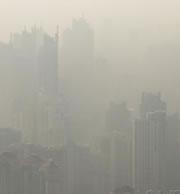 China's emissions from fossil fuels went up 8% from 2005 to 2006.Punchstock
China's emissions from fossil fuels went up 8% from 2005 to 2006.PunchstockChina has overtaken the United States as the world's top annual emitter of carbon dioxide, according to a report from the Netherlands Environmental Assessment Agency.
How did that happen?
The figures show that China's boom in the number of coal power plants to feed the country's growing energy needs took them to a very close second behind the United States in emissions from fossil fuels in 2006. But emissions from China's growing cement production industry (which now accounts for 44% of the world's total) pushed them into the lead, with cumulative CO2 emissions of 6,200 million tonnes, compared with 5,800 million tonnes from the United States.
Is that a surprise?
Not really. Many had predicted that China would soon overtake the United States in emissions, although estimates for exactly when this would happen have ranged from 2007 to 2010.
Why can't it be more accurately predicted?
Emissions can change a lot from year to year, thanks to a number of factors. And it can be hard to keep track. Air monitoring stations are not precise or widespread enough to keep tabs on national emissions. So the Dutch study uses data from the oil company BP (British Petroleum) on oil, gas and coal use around the world in 2006, and data on cement production (a major source of emissions, since heating limestone produces CO2) from the US Geological Survey.
Are those numbers definitive then?
They don't include international transport, emissions of other greenhouse gases such as methane, or environmental factors such as deforestation or underground coal fires. And the values for fossil fuels are only estimates — they could be off by about 5% for China, says Jos Olivier, senior scientist with the Netherlands Environmental Assessment Agency (compared to about 1% error for the United States, he adds). But these numbers do look at major sources of emissions and the trend is clearly right.
If the emission tally is correct, does that mean that China is the least 'green' country on the planet?
Not really. Although China has the biggest annual emissions, its per capita emissions are still much lower than the world average, and about a quarter of those for the United States. So on average, Chinese citizens live greener life, in terms of emissions, than most of the rest of the planet's inhabitants.
But how fast are Chinese emissions rising?
Fast, because the standard of living is rising too. The country is building about 2 power stations a week. Its emissions from fossil fuels went up 8% from 2005 to 2006, contributing heavily to the overall global rise of 2.6%.
Can anything be done about that?
China unveiled its first national plan on climate change earlier this month. The scheme outlines the country's aim to reduce 'energy intensity' — the amount of energy needed per unit of GDP — by 20% by 2010. But the Chinese economy is, today, growing at 10% a year. If it were to keep that up, then in 2020 its economy would be 3.5 times larger than it is today. That would mean far greater carbon dioxide emissions even if the energy intensity goals were met.
China also aims to increase renewable energy sources and re-forest the countryside. But what it really needs to keep emissions in check are clean coal technologies. "It can't do much about cement except use less in its construction," says Olivier.
Are other countries' emissions rising too?
ADVERTISEMENT
Yes and no. Other big developing countries' emissions from fossil fuels went up 4% from 2005 to 2006. Russia's rose 5%. Those in the European Union remained relatively constant. Japan dropped by 1.6% and the United States by 1.4%. Why the declines? It could be "the economy, the weather— mild winters reduce energy use. And fuel prices going up", says Olivier.
So what happens next?
No one knows — although China's emissions aren't set to slow anytime soon. "I can't hazard [a guess at] any numbers. It depends whether countries take some actions," says Olivier.
Visit our topsco2_emissions.html">newsblog to read and post comments about this story.
